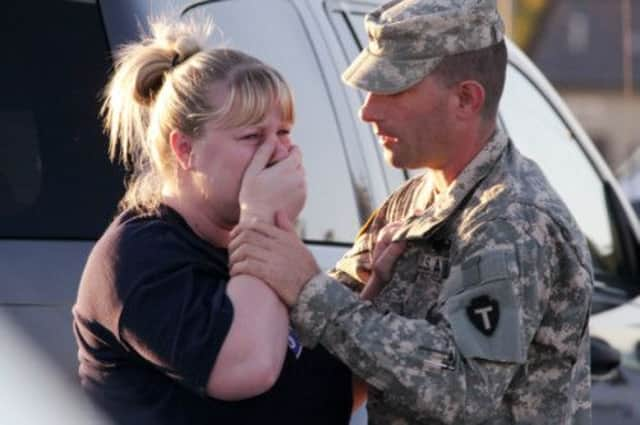America: Trial begins of massacre accused


Major Nidal Malik Hasan, 42, doesn’t deny that he carried out the November 2009 rampage at Fort Hood, one of the worst mass shootings in US history. There are dozens of witnesses who saw it happen. Military law prohibits him from entering a guilty plea because authorities are seeking the death penalty.
No active-duty US soldier has been executed since 1961.
If Hasan, a former army psychiatrist, is convicted and sentenced to death, there are likely years, if not decades, of appeals ahead. He may never make it to the death chamber at all. The attack occurred in a building where hundreds of unarmed soldiers, some about to deploy to Afghanistan, were waiting for vaccines and routine check-ups.
Advertisement
Hide AdAdvertisement
Hide AdHasan walked inside with two handguns, climbed on to a desk and shouted “Allahu Akbar!”. Then he fired, pausing only to reload.
Hasan was shot and critically wounded to end the massacre. He is now confined to a wheelchair.
Hasan is charged with 13 specifications of premeditated murder and 32 specifications of attempted premeditated murder. More than 30 people were wounded in the shooting.
Thirteen officers from around the country who hold Hasan’s rank or higher will serve on the jury for a trial that will likely last one month and probably longer. They must be unanimous to convict Hasan of murder and sentence him to death. Three-quarters of the panel must vote for an attempted murder conviction.
Death penalty cases are rare in military courts.
A study in the US Journal of Criminal Law & Criminology identified just 41 cases between 1984 and 2005 where a defendant faced a court-martial on a capital charge. Eleven of the 16 death sentences handed down by US military juries in the last 30 years have been overturned, according to the study and court records.
Meanwhile, more than 500 people have been executed since 1982 in the civilian system in Texas, the nation’s most active death-penalty state.
The trial’s start has been delayed over and over again, often due to requests from Hasan. Any of the hundreds of decisions large or small could be fair game on appeal. The entire record will be scrutinised by military appeals courts that have overturned most of the death sentences they’ve considered.
Hasan has twice dismissed his lawyers and now plans to represent himself at trial. He’s suggested he wants to argue the killings were in “defence of others” – namely, members of the Taleban fighting Americans in Afghanistan. The trial judge, Colonel Tara Osborn, has so far denied that strategy.
Advertisement
Hide AdAdvertisement
Hide AdIn a ruling on Friday, Col Osborn allowed prosecutors to present evidence that Hasan was on the internet in the days – and even hours – before the attack, searching terms such as “Taleban” and “jihad”, which some Islamists define as a holy war.
Hasan has grown a beard while in custody that he says expresses his Muslim faith, but violates military rules on decorum. After a military judge ordered him forcibly shaved, an appeals court stayed that order.
The last man executed in the US military system was Private John Bennett, hanged in 1961 for raping an 11-year-old girl. Five men are on military death row at Fort Leavenworth, Kansas, but none are close to being executed.
If Hasan is convicted, President Barack Obama, as military commander in chief, must sign off on a death sentence.